8 start with P start with P

A Philosophy of Freedom questions how we can successfully create meaningful lives when we are estranged from the very concept of freedom. Svendsen tackles such issues as the nature of free agency and the possibility of freedom in a universe governed by natural laws. He concludes that the true definition of personal freedom is first and foremost the liberty to devote yourself to what really matters to you—to realize the true value of the life you are living. Drawing on the fascinating debates around the possibility of freedom and its limits within society, this comprehensive investigation provides an accessible and insightful overview that will appeal to academics and general readers alike.
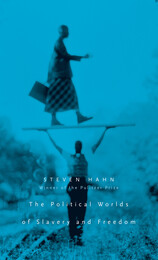
Pulitzer Prize–winner Steven Hahn’s provocative new book challenges deep-rooted views in the writing of American and African-American history. Moving from slave emancipations of the eighteenth century through slave activity during the Civil War and on to the black power movements of the twentieth century, he asks us to rethink African-American history and politics in bolder, more dynamic terms.
Historians have offered important new perspectives and evidence concerning the geographical expanse of slavery in the United States and the protracted process of abolishing it. They have also uncovered a wealth of new material on the political currents running through black communities from enslavement to the present day. Yet their scholarship has failed to dislodge familiar interpretive frameworks that may no longer make much sense of the past.
Based on the Nathan I. Huggins Lectures at Harvard University, The Political Worlds of Slavery and Freedom asks why this may be so and offers sweeping reassessments. It defines new chronological and spatial boundaries for American and African-American politics during the first half of the nineteenth century. It suggests, with historical comparisons, that we may have missed a massive slave rebellion during the Civil War. And it takes a serious look at the development and appeal of Garveyism and the hidden history of black politics it may help to reveal. Throughout, it presents African Americans as central actors in the arenas of American politics, while emphasizing traditions of self-determination, self-governance, and self-defense among them.
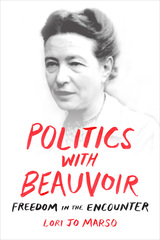
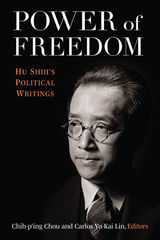
For decades—and today to a certain extent—Hu Shih’s political writings were considered sensitive and even dangerous. As a strident critic of the Chinese Communist Party’s oligarchical practices, he was targeted by the CCP in a concerted national campaign to smear his reputation, cast aspersions on his writings, and generally destroy any possible influence he might have in China. This volume brings together a collection of Hu Shih’s most important, mostly unpublished, English-language speeches, interviews, and commentaries on international politics, China-U.S. relations, and the International Communist Movement. Taken together, these works provide an insider’s perspective on Sino-American relations and the development of the International Communist Movement over the course of the 20th century.

Watney’s voice—neither neutral nor detached—is that of an active and influential participant in the fight against AIDS. He offers a unique view of the ways in which gay men working in community-based organizations have attempted to provide reliable and up-to-date services and information regarding AIDS treatment and health. A leader in insisting on gay men’s entitlements to education, care, and services, Watney was among the first to challenge the "de-gaying" of AIDS service organizations in the late eighties. He also devotes his attention to HIV/AIDS prevention work, research and treatment issues, and the wider cultural politics of the disease, including the role of language, television, and cinema. His analysis of the epidemic as it has unfolded provides a history of many of the major medical and political debates that have defined the course and extent of the crisis.
Practices of Freedom demonstrates the failure of national institutions, from the government to the press, to understand and effectively fight this epidemic, and directs attention to the most urgent needs in American and international AIDS work. It will be an important primary resource, particularly in the United States, where effective community-based HIV/AIDS education tragically has often been neglected.

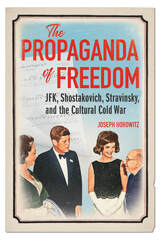
Eloquently extolled by President John F. Kennedy, the idea that only artists in free societies can produce great art became a bedrock assumption of the Cold War. That this conviction defied centuries of historical evidence--to say nothing of achievements within the Soviet Union--failed to impact impregnable cultural Cold War doctrine.
Joseph Horowitz writes: “That so many fine minds could have cheapened freedom by over-praising it, turning it into a reductionist propaganda mantra, is one measure of the intellectual cost of the Cold War.” He shows how the efforts of the CIA-funded Congress for Cultural Freedom were distorted by an anti-totalitarian “psychology of exile” traceable to its secretary general, the displaced Russian aristocrat/composer Nicolas Nabokov, and to Nabokov’s hero Igor Stravinsky.
In counterpoint, Horowitz investigates personal, social, and political factors that actually shape the creative act. He here focuses on Stravinsky, who in Los Angeles experienced a “freedom not to matter,” and Dmitri Shostakovich, who was both victim and beneficiary of Soviet cultural policies. He also takes a fresh look at cultural exchange and explores paradoxical similarities and differences framing the popularization of classical music in the Soviet Union and the United States. In closing, he assesses the Kennedy administration’s arts advocacy initiatives and their pertinence to today’s fraught American national identity.
Challenging long-entrenched myths, The Propaganda of Freedom newly explores the tangled relationship between the ideology of freedom and ideals of cultural achievement.
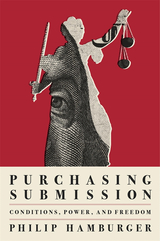
From a leading constitutional scholar, an important study of a powerful mode of government control: the offer of money and other privileges to secure submission to unconstitutional power.
The federal government increasingly regulates by using money and other benefits to induce private parties and states to submit to its conditions. It thereby enjoys a formidable power, which sidesteps a wide range of constitutional and political limits.
Conditions are conventionally understood as a somewhat technical problem of “unconstitutional conditions”—those that threaten constitutional rights—but at stake is something much broader and more interesting. With a growing ability to offer vast sums of money and invaluable privileges such as licenses and reduced sentences, the federal government increasingly regulates by placing conditions on its generosity. In this way, it departs not only from the Constitution’s rights but also from its avenues of binding power, thereby securing submission to conditions that regulate, that defeat state laws, that commandeer and reconfigure state governments, that extort, and even that turn private and state institutions into regulatory agents.
The problem is expansive, including almost the full range of governance. Conditions need to be recognized as a new mode of power—an irregular pathway—by which government induces Americans to submit to a wide range of unconstitutional arrangements.
Purchasing Submission is the first book to recognize this problem. It explores the danger in depth and suggests how it can be redressed with familiar and practicable legal tools.
READERS
Browse our collection.
PUBLISHERS
See BiblioVault's publisher services.
STUDENT SERVICES
Files for college accessibility offices.
UChicago Accessibility Resources
home | accessibility | search | about | contact us
BiblioVault ® 2001 - 2024
The University of Chicago Press









